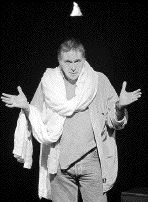
From
the |
||||
| Mancuso
as Socrates as Oliver North 'It was a huge task to take on this guy,' says the actor of his one-man show |
||||
| Sharon
Dunn, National Post |
||||
"Do you know the difference between an American lobster and
a Canadian lobster?" asks actor Nick Mancuso, just a couple of days
before the premiere of his one-man show. "Well, with American lobsters,
you have to put the lid on the pot when you're boiling them, otherwise
they'll all try to get out. But with Canadian lobsters, you don't
have to put the lid on because if one tries to get out the others
will drag him back in."
Mancuso uses the lobster analogy to explain what it's like being a Canadian
artist in Canada and why he left to pursue his acting career in the United
States more than 25 years ago. Since then, he's been in more than 100 movies, and co-starred in more
than half of them with the likes of Raquel Welch and Kim Basinger. Now, the 54-year-old Italian-born actor has returned to Toronto. "Nadia,
my wife, and I decided to raise our son, Sacha, here so he can be around
family." His one-man show, The Death of Socrates, opened last night at Artword,
and on Wednesday when I talked to him he certainly wasn't anticipating an
enthusiastic response. "I expect nothing but bad reviews and a negative response," he said, primarily
because the Canadian media is "unfair" when one of their own tries something
different. "Yours is the only paper that even bothered to come out and cover this
story. But I'll continue to do it [his show] and other stories of the same
ilk because I believe these kinds of stories need to be told." Mancuso says the plain truth is that "in Canada if you try to stand out
in the performing arts the reaction is, 'Who does he think he is?' " And he does stand out, at least in part because there aren't all that many people who are passionate these days about Socrates. "The thing about Socrates is that he is underrated. I was looking for
a character who would keep me interested but I think I bit off more than
I can chew. It was a huge task to take on this guy." Mancuso, who majored in philosophy at the University of Guelph, gives
me a quick lesson on the ancient Greek teacher. "Socrates expressed the foundation
of human democratic thinking about 400 years before Christ. He was found
guilty by a jury of 600 Athenians (by a margin of only 30 votes) of heresy
against the city gods and the corruption of youth." Plato's Apology, which recounts Socrates's speech to the Senate, is regarded
as the first courtroom drama ever recorded, and thus prime material for drama,
says Mancuso. "After his conviction, when Socrates went in front of the jury to make
his speech," Mancuso says, "they had three options. They could have exiled
him, they could have fined him and they could have executed him." The jury sentenced him to death. "That's because he pissed the jury off
so much. In Greek it's called arete -- manhood. He looked them in the eye
and said, 'I am not afraid to die.' It wasn't false courage in the face of
death, it was sticking with his beliefs. His students tried to bust him out
of jail, but he said, 'Why would I do that. Athens gave me life and now death.
I'm not afraid of death because I don't know what it is.' " Mancuso says the last time Socrates was portrayed in Canada was in the
1950s, when Mavor Moore did the classic Socrates -- you know, the fuddle-duddle
professor, Mr. Magoo kind of character." But Mancuso says his adaptation results from another vision of the great
Greek, the man who found truth by asking questions. "I'm doing a modern-day
Socrates as an Oliver North type of character -- a soldier, a fighter, a
spiritual warrior. "Socrates died because he believed in the right of the individual to worship
the god of his choice. It was all about the separation of church and state.
In those days they were autocrats, like Hussein." Socrates, said Mancuso,
believed these rights were worth putting himself on the line for. "He fought
it, and all modern democratic beliefs can be traced back to Socrates." Of Socrates the man, Mancuso says, "I don't know much about the soap-opera
aspect to Socrates's life, but I do believe the theory that he was a henpecked
husband because he was wandering around the agora [marketplace] all day.
And when he finally came home, his wife would have had reason to nag him
about it." But, ultimately, Socrates is famous as the teacher who taught his students to ask questions, and more questions, to find truth. Mischievously, I ask a question of my own: "Who do you like better, Raquel Welch or Socrates?" "That's a tough one," he replies, without missing a beat. "What they have
in common is that they don't get enough respect. Raquel did it all on her
own. She's a tough-minded woman who worked hard to get where she is. Don't
underestimate Raquel," he says. "And don't underestimate Socrates." The Death of Socrates continues to Dec. 1 at Artword Theatre, 75 Portland St. |
||||
| Last
update:
May 6, 2009
© Copyright 2009, National Post Email: Sharon Dunn Email: Webmaster |
||||
